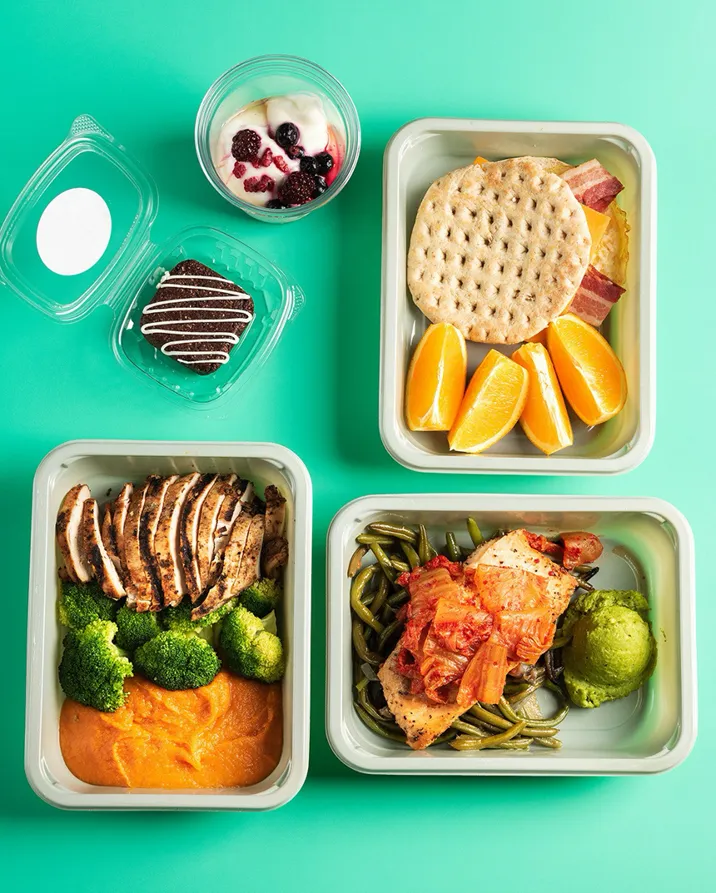Meal Plan FAQ’s Answered – Part 2
We hope you enjoyed our first Meal Plan FAQ post and that it helped you to understand more about our meal plans. Here is Part 2! Keep reading to dive into common questions related to meal plan duration, results, weight loss, protein and carbs.
Can You Customize the Length of my Meal Plan?
Yes we can! Our standard meal plans provide 3, 6 or 7 days of meals per week. However, we can customize any of our plans to fit your lifestyle. If you prefer to receive just 4 or 5 days of meals each week, we can do that. We can also adjust the length of the overall plan to fit your schedule. If you prefer to order 2 weeks of meals at a time, or want to a longer plan for 6 weeks, we can make either of those schedules work. Just send us an email to eatfit@fitkitchen.ca and we can get your custom plan set up!
How Long Will It Take to See Results?
Results can take time and it is important to stay consistent in order to achieve them. Many factors will affect the length of time to see results. For example, in order to meet a weight loss goal, your calorie intake, physical activity, alcohol consumption and sleep will all affect your results. For weight loss, it is best to choose a moderate goal of 1-2 lbs of weight loss per week. Evidence shows that those who lose weight more slowly, are more likely to keep it off. If you were used to eating 2000 calories per day, and decrease your intake to 1500 calories with our Small Lean meal plan, you could expect to see weight loss of about 20 lbs in 6 months.
How Much Protein Do I Need?
Protein is a very important macronutrient and your protein needs vary based on age, activity level, fitness goals, and many other factors. The current recommendation is that all adults should get at least 0.8 g of protein per kg of body weight, per day. However, this is based on a calculation method which is now thought to be inaccurate, and many experts are recommending that higher protein intakes can be beneficial. Here are some general guidelines (1, 2):
- Adults 18-65 yrs – 1.2 g/kg per day
- Adults over 65 yrs – 1.3 g/kg per day
- Adult Endurance Athletes – 1.2-1.6 g/kg per day
- Adult Strength/Power Athletes – 1.6-2.0 g/kg per day
Our meal plans provide about 25-30% of calories from protein. For example, our Small Lean plan provides about 100 g of protein per day while our Large Lean plan provides about 130 g of protein per day. For someone who weighs 150 lbs (68 kg), our Small Lean plan provides enough protein for 1.4 g/kg per day. For someone who weighs 200 lbs (91 kg), our Large Lean plan provides enough protein for 1.4 g/kg per day. Unless you are a serious athlete or bodybuilder, most of our meal plan provide adequate protein to maintain healthy diet.
Should I Eat Low-Carb in Order to Lose Weight?
Eating low-carb or keto is often associated with weight loss because these types of diets can help to lower your caloric intake or the amount of food you eat in a day. However, you can still lose weight while eating carbs, as long as you lower your overall caloric intake. In order to lose weight, it is necessary to consume less energy (calories) than you expend throughout the day. This is called being in a ‘calorie deficit’. Many studies have shown that the ratio of fat, carbs and protein you consume doesn’t have an effect on weight loss, as long as you stay in a calorie deficit (3, 4).
Some people do find that eating a diet higher in protein and fat helps to keep them full for longer. The same effect can be true for diets high in whole grains and fibre. Carbohydrate sources high in fibre like quinoa, oats and legumes may appear to be high in carbs on paper, but the fibre prevents a spike in blood glucose and can help to sustain you over a long period. Ultimately, it is up to you whether you want to avoid carbs in your weight loss journey, but there’s no need to cut them out completely if it will make you miserable.
Our standard meal plans provide about 30% of calories from carbohydrates each day. Most of these carbs come from sources like whole grains, legumes, and fruit or dried fruit.
Conclusion
Thanks for reading Part 2 of our Meal Plan FAQ blog! We hope that these two blogs helped to clarify some common queries and that they can save you some time and research in the future. Please don’t hesitate to reach out to eatfit@fitkitchen.ca if you would like to set up a custom meal plan. Our team will be happy to help and can answer any further questions.
References:
- Protein: A nutrient in focus
- International Society of Sports Nutrition position stand: protein and exercise
- Metabolic Effects of Weight Loss on a Very-Low-Carbohydrate Diet Compared With an Isocaloric High-Carbohydrate Diet in Abdominally Obese Subjects
- Long-term effects of a very-low-carbohydrate weight loss diet compared with an isocaloric low-fat diet after 12 mo


